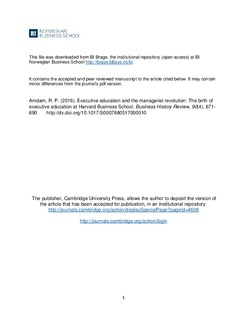| dc.contributor.author | Amdam, Rolv Petter | |
| dc.date.accessioned | 2017-04-25T09:06:55Z | |
| dc.date.available | 2017-04-25T09:06:55Z | |
| dc.date.issued | 2016 | |
| dc.identifier.citation | Business History Review, 90(2016)4, 671-690 | nb_NO |
| dc.identifier.issn | 0007-6805 | |
| dc.identifier.issn | 2044-768x | |
| dc.identifier.uri | http://hdl.handle.net/11250/2440642 | |
| dc.description | The accepted and peer reviewed manuscript | nb_NO |
| dc.description.abstract | The managerial revolution drove the rise of business schools in the United States and business schools contributed by graduating professional managers. Before World War II, however, the effect of an MBA degree was modest, causing great concern to leading business schools. Harvard Business School—in order to increase this impact—began in the mid-1920s to develop nondegree programs for potential top executives. In 1945, by drawing on the experiences of certain short-lived programs and the extraordinary situation during the war, Harvard Business School launched its Advanced Management Program, which became a global role model for executive education. | nb_NO |
| dc.language.iso | eng | nb_NO |
| dc.publisher | Cambridge Univesity Press | nb_NO |
| dc.title | Executive education and the managerial revolution: The birth of executive education at Harvard Business School | nb_NO |
| dc.type | Journal article | nb_NO |
| dc.type | Peer reviewed | nb_NO |
| dc.source.journal | Business History Review | nb_NO |
| dc.identifier.doi | http://dx.doi.org/10.1017/S0007680517000010 | |
| dc.description.localcode | 1. Forfatterversjon | nb_NO |
